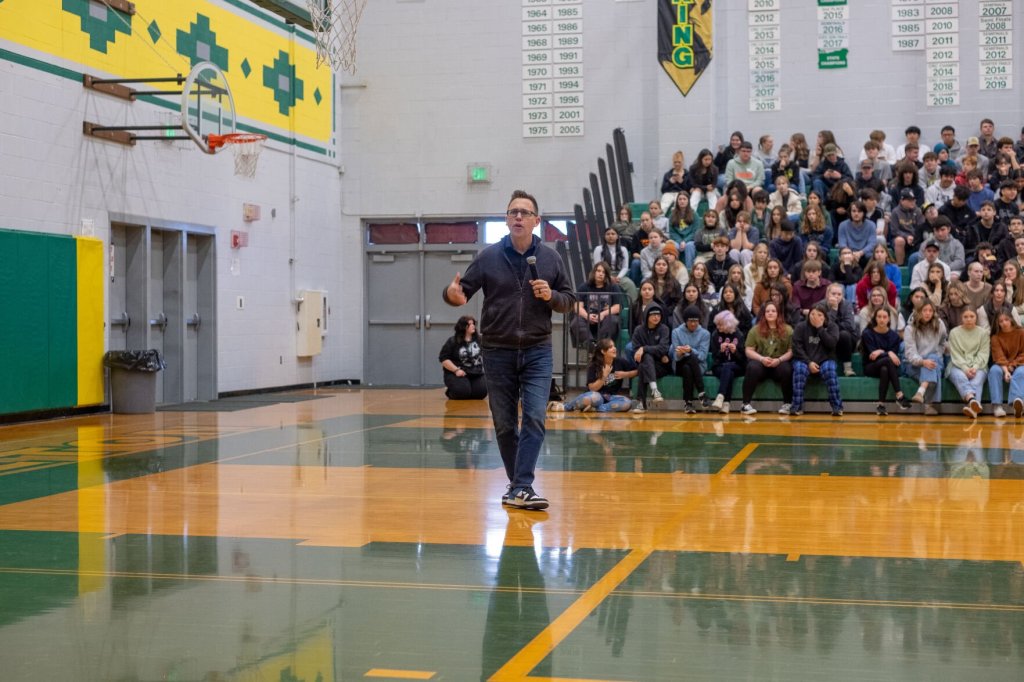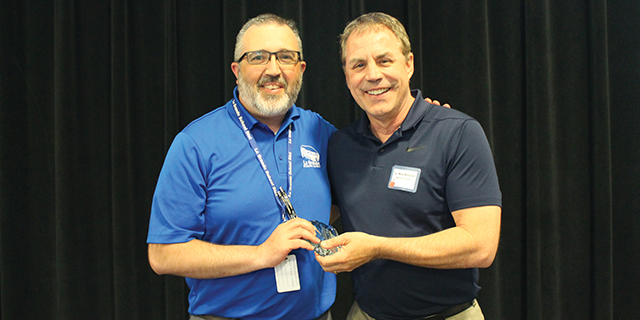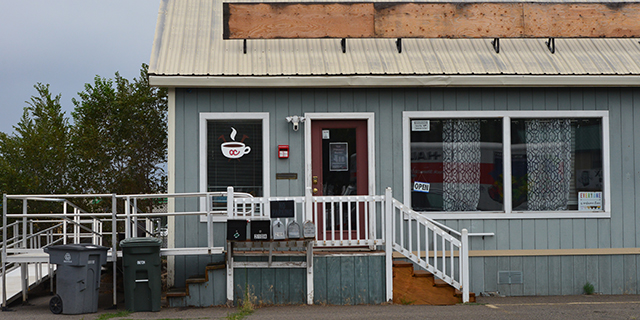School speaker suggests questionable response to bullying
Published 7:00 pm Wednesday, January 3, 2024

- Brooks Gibbs host a seminar on reacting to bullies Dec. 13, 2023, to a group of students at Pendleton High School.
PENDLETON — Pendleton schools recently hosted an anti-bullying speaker whose approach for how to handle being bullied boils down to responding to the aggressor with kindness.
But a Pendleton-based trauma therapist disagrees with that take on how to deal with being bullied.
The speaker, Brooks Gibbs, whose LinkedIn says he’s a “mental health influencer,” is a writer and presenter on bullying. Gibbs has honed a 40-50 minute keynote presentation that can be paired with educational materials about resiliency. He says his presentations teach emotional resilience in children so they aren’t affected by attempts at bullying.
The Confederated Tribes of the Umatilla Indian Reservation hired Gibbs to present at Nixyaawii Community School. Because he was coming anyway, and costs upward of $4,000 to hire as a speaker, CTUIR asked him also to speak to students at Pendleton High School, Sunridge Middle School and Washington Elementary School.
Gibbs toured the schools on Dec. 13, giving a variation of his keynote address at each school.
“What my message comes down to is don’t get upset, and treat them like a friend,” Gibbs said after his presentation at Pendleton High School. “It’s about choosing your response.”
During the talk, Gibbs — who goes by Dr. Brooks — had walked the line between putting responsibility of being bullied onto the people who experience it and empowering those people.
“We only blame people for things they do on purpose,” Gibbs said about that balance. “People need to take responsibility for their emotions and stop blaming other people.”
To a degree …’
Gibbs has written a few books on the topic of bullying and emotional resilience and has a Ph.D., which he says is in social psychology. He earned the Ph.D. in 2020.
However, that Ph.D. is from Atlantic International University, an online school that is not accredited through an accreditor recognized by the U.S. Department of Education or the American Psychological Association, which is the main accreditor for education and training in psychology in the United States.
His degree also is technically a Ph.D. in sociology, combined with a master’s degree in psychology. Social psychology is a subset of psychology but does overlap with sociology too.
Gibbs said in an interview Dec. 21 that “the American Psychological Association demands that if you call yourself a psychologist, you are licensed by the APA, and so I just decided I’m going to avoid that whole world.”
According to AIU’s website, the school takes “a student ‘self-instruction’ approach (with guidance), the collaborative development of a curriculum that is unique to each student, and the flexibility of time and place of study.”
A page on its website claims Gibbs has received three degrees from the school — bachelor’s, master’s and doctorate — but on Gibbs’ LinkedIn page, he lists only two degrees from AIU. There, he lists a bachelor of arts in biblical studies from Horizon University, which he attended before it was accredited, though it does have that status now.
Regardless, Gibbs worked in the mental health and bullying field for around two decades before receiving his doctorate, and he said education is not a requirement for anyone in his profession.
“A degree was never a priority,” he said. “I did it because I just love learning and so I’ve just continued to educate myself.”
He, like many other authors and speakers, is self-employed. Speakers and authors use their life stories and experiences to deliver their message without any formal training at all, he pointed out. Essentially, Gibbs made the point that being an expert in his field doesn’t require a degree.
“People are not going to hire you if you’re an idiot and if you’re not making sense,” Gibbs said. “They want to make sure that your content is solid and people resonate with it.”
Pick your (emotional) battles
Gibbs, during his talk at Pendleton High School, told students no one can make another person feel any particular way; a person’s belief system must first process someone’s words or actions before becoming an emotional consequence, or what we feel.
“It’s not what they said that disturbed you,” Gibbs told students at Pendleton High School, “but it was your demand that they must not, ought not, should not, better not say that.”
If, instead, a person takes a flexible and indifferent approach, essentially brushing off the mean things people say to bother them, Gibbs said he believes they’re going to be better off.
“The enemy in your life is actually not your enemy,” Gibbs said. “The real enemy is your offendability. The fact that you are offended is the reason why you have a conflict with people.”
Gibbs suggested students figure out how to adjust their expectations, or demands, for how others treat them, because without those supposed rigid demands, he said, no one can offend them.
“And when you’re not offended, no one can fight with you, because you refuse to fight back,” Gibbs said. “It’s the victim mindset that is the enemy. If we victim-proof students, we bully-proof students.”
In the Dec. 21 interview, Gibbs said he generally believes what he’s promoting is supported by academic research and ideas that private practice therapists agree with.
“I haven’t said anything that wasn’t founded outside of cognitive behavioral therapy,” he said. “That’s what every counselor and therapist is taught, so this is general knowledge.”
He said he presents to and hears from psychologists frequently about how much value they find in his approach to social problems.
A different view
However, Emily Arnold, child trauma therapist and owner of Eastern Oregon Trauma Center in downtown Pendleton, said she doesn’t believe bullying is something we can simply brush off.
Especially for children and teenagers, she said, we as adults can’t expect them to always and fully regulate their emotions. Instead, they need safe spaces to work through those emotions with the guidance of an adult.
“It’s up to adults to protect kids,” said Arnold, who has a master’s degree in social work from the University of South Carolina-Columbia, an accredited university in the U.S. since 1917. “It’s not that children have no personal responsibility, but adults bear a larger percentage of the responsibilities, especially when they’re in a school setting.”
Arnold said she believes bullying often is part of a trauma response, and adults make the mistake of expecting youths to know what to do or how to handle complicated social situations.
“Our children are in the middle of a mental health crisis, and I think the bullying is a symptom of that,” she said.
Gibbs stressed people are responsible for the emotions they feel, and no one can make anyone feel a certain way. He said, “There’s very little that anyone can do to control the mean behavior of someone else. All you can do is control how you perceive and react to the behavior, and avoid the person if possible.”
Arnold, conversely, said it’s adults’ responsibility to create systems and environments to protect young people. For her, talking to the students about their actions and emotions matters, but not as much as the structures and systems that surround them do.
“I would say that, ultimately, kids need to understand that they don’t have to tolerate someone physically or verbally assaulting them,” she said. “If I were to tell a kid what to do, I would tell them to go to an adult. I wouldn’t tell them to change their mindset.”
The victim and the bully, she said, each needs support.
An environment of safety
When we experience bad or traumatic things, Arnold said, it’s not just shaping our beliefs.
“It actually changes our brain chemistry, it changes our nervous system,” she said. “The work that I do is, I work with kids who have experienced these things and I work with them to recognize the way that it’s changed their nervous system and the way that they see things, and we work to correct that.”
There is, as Gibbs said, an element of choice, Arnold agreed. But, she said, for healing to happen, an environment of safety is necessary.
“I can work on healing the trauma all day long,” she said, “but if they’re still getting beat up in their home, then their nervous system is getting altered again every day.”
Then, if they go to school and there’s still not an environment of safety, their nervous system could be constantly on high alert or might easily go into fight mode.
“So, I guess,” she said, “it’s hard without that environment of safety to even teach the standard things that you would teach.”
Arnold made a point to say she doesn’t think the schools in Pendleton are doing a bad job. She simply wanted to say that bullying, and dealing with bullies, isn’t just on the students. While high schoolers, for example, are old enough to take responsibility for their actions, that can best be done with the help of an adult to guide them.
In her professional opinion, the response to bullying is not something children and teens should be expected to handle and brush off. Their reaction should be to get adults to intervene, she said, and for those adults to then help create a safer environment for both sides of the interaction, the person doing the bullying and the person experiencing it.
“They need to be supported through these conversations and taught on how to navigate these things,” she said. “They might not know another way, so we’ve got to give them another way.”
“It’s the victim mindset that is the enemy. If we victim-proof students, we bully-proof students.”
— Brooks Gibbs, anti-bullying speaker





